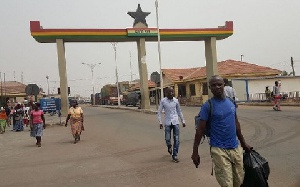It’s half past midnight, and a mini bus pulls up at the Ghana-Togo border at Aflao in the Ketu South District of the Volta Region.
On any other night, the driver and passengers traveling to or from Ghana and Togo would have been pondering over where to lay their heads and keep their belongings safe for the night.
But with the new situation, the border which closes at 10:00pm and opens at 6:00am some time back is now open at all times
The passengers who apparently did not know about the new situation expressed their surprise, as they were allowed to cross from Togo into Ghana although it is past 10:00pm, which was the official time for closing the border.
They enquire about the unusual incident, and one of the Customs officers inspecting their bus and processing their documents explains to them that “we are now operating 24 hours.”
Passengers and drivers alike light up in excitement and coincidentally ask at the same time, “Are you serious? This is so fantastic.” Business will be good,” Kwame Asihene, a driver said.
Since Friday, August 4, 2017, the men and women working on Ghana’s border with Togo have remained wide awake all day and all night, inspecting vehicles and processing documentations to ensure the smooth movement of passengers, goods and services.
A few days ago, most of them would have been off duty after 10:00pm resting at home to replenish their energies for the next day’s work which begins at 6:00am prompt.
However, with the new 24-hour opening of the border, these officials stay up throughout the night to safeguard the border, protect lives and property, and facilitate free movement of persons, goods and services; a key part of the Economic Community of West African States (ECOWAS) Protocols.
One of the reasons for the establishment of ECOWAS 42 years ago was to integrate the sub-region as one big community with the same aspirations in the area of security, economy, health, trade, among others.
The free movement of persons, goods and services among member states without any obstacles falls under the Economic and Trade Liberalisation Scheme (ETLS) of the Economic Community of West Africa (ECOWAS).
This means, all 15-member states, including Ghana and Togo, are expected to work towards opening their borders at all times, hence the introduction of the 24-hour border system.
Ghana-Togo border
The call for 24-hour border system between Ghana and Togo has been on the table since the 1990s. Although it came up again between 2003 and 2008 when former President Kufuor was president, it could not materialise.
However, in the run up to the 2016 elections, Nana Addo Dankwah Akufo-Addo, who was then the opposition leader of the New Patriotic Party (NPP), promised to ensure a strong integration between Ghana and its neighbours to facilitate trade, security and job creation, should he be given the mandate to lead the country.
A promise he had kept seven months into his tenure of office. The president has fulfilled that promise with the main eastern border between Ghana and Togo at Aflao commencing the 24-hour border operations.
This brings to an end two decades of partial closure from 10:00pm to 6:00 am daily, started by the Togolese authorities, following a failed coup attempt allegedly purported by Togolese in Ghana in the early 1990s.
In fact, Togo border officials began the 24-hour operation on Monday, July 31, four days ahead of Ghana, which began on Friday, August 4, 2017.
How it began
This became possible after the two countries had a bilateral understanding in July after an earlier discussion in May, this year.
At a state dinner held in his honour by the Togolese President Faure Gnassingbé in May, Ghana’s President Nana Akufo-Addo stressed the need for 24-hour opening of the borders between the two countries to boost trade and tourism between them.
He added that the move “will give true meaning to the ECOWAS Protocols on Free Movement of Goods and Persons and will spur on progress and prosperity for our people.”
“A functional common regional market in ECOWAS has to be a very fundamental objective of all our people and governments of the region. It is for this reason that I am very much for the 24-hour opening of the borders between our two countries,” he told Togolese President Faure Gnassingbé.
President Gnassingbé, in his response, also assured his neighbour of his preparedness to make the 24-hour border operation a reality.
This was followed by the MoU in July to begin the 24-hour operations.
Weeks later, the two countries began the operations, with Togo commencing four days ahead of Ghana.
Excitement of border users
Traders, travelers, tourists, diplomats and residents from both sides of the border have expressed excitement over the new 24-hour opening of the Ghana-Togo border.
Although the traffic is currently slow at night, they are hopeful that business will boom as the weeks go by.
A Nigerian, Halima Ashiadey, who was relocating to Ghana with her children and arrived after 11:00pm, stated, “This is so amazing because I thought we were coming to sleep on the Togo side since we were behind the 10:00pm border closing time. We got here and the border was widely open. This is so cool.”
Ghanaian traders who purchase their wares from Togo and Nigeria were also happy about the new situation.
“No more extortion from some border officials who assist us cross when we miss the closing time,” Ama Ataa Baayie, one of the traders, said.
Others also recounted very bitter experiences in the past which saw people who offered to assist them cross at odd hours rather ending up robbing them and, in some cases, injuring them.
Residents from both sides of the border, most of whom have families and businesses on either side, also lauded the opening which has increased business activities at transport terminals in Aflao, on the Ghana side and Kojoviakope in Lome, both day and night.
A commercial driver who plies Accra-Lagos and a truck driver who delivers goods from Ghana to other countries in the sub-region confessed that they wouldn’t have to speed excessively anymore to beat the 10:00pm closing time.
Transport operators and traders at the bus terminals in Aflao have also begun cashing in on the new development, as they have extended their closing times beyond 10:00pm, particularly the long coaches that travel very long distances.
Preparedness of Border Officials
Border officials who collaborate with the Border Security Committee (BODSEC) have, since the beginning of August, revised their operations to suit the 24-hour operations.
They include the Customs Division of the Ghana Revenue Authority (GRA), Ghana Immigration Service (GIS), Defence Intelligence, Narcotics Control Board (NACOB), National Security, Military Intelligence, Port Health, Plant Protection, Foods and Drugs Authority (FDA), Ghana Standards Authority (GSA), Bureau of National Investigations (BNI) and many others.
According to them, the processes at the border remain the same, but with a more improved strategy in order not to allow the wrong people to enter at will.
The Immigration and Customs who form the majority and are the key managers of the Aflao border stressed that they are prepared to ensure the success of the new directive.
The Aflao Sector Commander of GIS, Chief Superintendent Justice Amevor, told DAILY GUIDE that “everything has been in place for a long time. Our men are prepared. We have always been prepared and only waiting on government and the head office to give the go ahead.”
The Aflao Sector of the Customs Division of GRA, Chief Revenue Officer Kafui Modey, also said, “The moment our president began to discuss the issue with his Togolese counterpart, we started activating our 24-hour operation strategy which has always been in existence.”
She added that as part of the new border arrangement, three out of the five Customs barriers between Aflao and Ho have been closed down and transformed into strategic duty posts.
The chief revenue officer was optimistic that the Customs within Aflao sector would exceed their 2017 target of GH¢ 273.24 million as the 24-hour operations gain momentum
Although talks are ongoing to include Akanu and Sege borders in the near future, the 24-hour operation does not include the smaller points, known as pedestrian crossing from Beat Zero to Nine Pillar 1 to 16.
To this end, the night before the border was opened, they faced challenges manning Beat Zero to Pillar 16, the 16-kilometre long frontier full of unapproved and dangerous routes used by criminals.
The two agencies, together with other security agencies – police, military and the like have increased patrols at the smaller points.
Challenges
The two senior officers mentioned that despite their preparedness and zeal, they lack adequate staff, as the new arrangement has outstretched them.
They reminded their superiors and government about earlier pleas for more staff.
Another key constraint is lack of logistics such as vehicles, communication gadgets, binoculars, protective gear, bullet proof, arms, accommodation, operational tents/shelter, mosquito repellents, overalls, motor bikes, among others.
Considering the plethora of unapproved routes, particularly along the frontier from Beat Zero (Border line), all the way to Akanu, they made a passionate appeal to government to construct an access road along the south-eastern frontier between Ghana and Togo to facilitate patrols and also flush out miscreants who use illegal routes in and out of the country.
Observations
Apart from border residents who frequently cross the border, the Immigration records an average of 3,000 crossings daily.
Despite the excitement by traders, tourists and residents over the move, activities after 10:00pm are slower than expected, with a modest average crossing of 10 percent during the night.
They attributed this to low publicity. They were optimistic with time, the information will catch up with people and patronage will improve.
Some travelers and traders from Togo and beyond who enter into Ghana after 10:000pm also prefer to park and wait till dawn, thus, from 3:00am before continuing their journey.
Way forward
All users of the border agree with border officials that there should be enough publicity about the new arrangement to stimulate activities at the border at night even more.
The Sector Commanders of Immigration and the Customs in Aflao, as well as the Paramount Chief of the Aflao Traditional Area, Togbe Adzonugaga Amenya Fiti V, underscored how critical it is to integrate the operations of all border agencies, particularly Immigration and Customs, just as it is done at the airport to ensure efficiency and better service delivery for clients.
More so, border management shouldn’t be delinked from the overall national security plan, as a poor border management and security will threaten the security of the country as a whole.
They also called for closer international collaborations, especially with Togo, to share experiences and challenges regarding complaints of their nationals, travelers and clearance of goods to free up businesses as per the concept.
The partnership should also help fight cross border crime and smuggling along the frontier. More so, facilities must be improved frequently to meet the demands of the 24-hour operations.
The border officials also called on the chiefs, opinion leaders and residents of Aflao and its environs saying, “We are appealing to them to work with us so that we can bring order and security, reduce crime, mobilise the necessary revenue for the development of the community. With more revenue, government can develop the area even better.”
freduoo@gmail.com
Opinions of Thursday, 31 August 2017
Columnist: Fred Duodu















